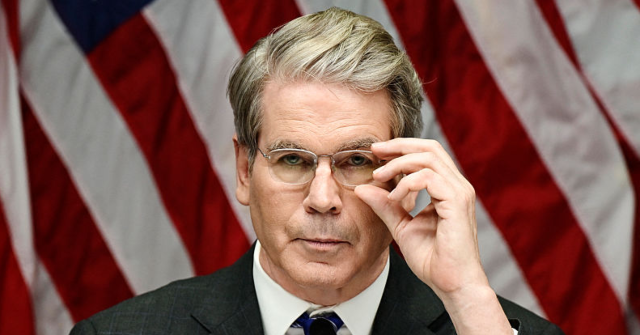Brazilian Finance Minister Fernando Haddad claimed on Monday that alleged “far-right forces” operating with the White House forced the cancellation of a meeting he had scheduled with U.S. Treasury Secretary Scott Bessent.
Haddad was reportedly slated to hold a remote meeting with Bessent on Wednesday, August 13 to discuss the subject of U.S. tariffs on Brazilian goods. The Brazilian finance minister spoke with GloboNews on Monday evening and claimed, without evidence, that the meeting was cancelled after the actions of “far-right forces” operating in the United States.
According to Haddad, the United States cited a “lack of agenda” to cancel the meeting, which the finance minister described as a “very unusual situation.”
Haddad failed to address the impact that leftist President Luiz Inácio Lula da Silva refusing to call President Donald Trump directly may have on potential trade negotiations.
“What is clear to us is that the trade issue is not the focus,” he alleged. Haddad said that he unsuccessfully tried to reschedule the meeting with Bessent’s office.
“The anti-diplomatic militancy of these far-right forces working with the White House… acted together with some advisors, and the virtual meeting that was to take place on Wednesday was canceled,” Haddad reportedly said.
The finance minister directly blamed Brazilian Senator Eduardo Bolsonaro, son of conservative former President Jair Bolsonaro, for interceding to have the meeting cancelled, offering no evidence of such a private intervention. Eduardo Bolsonaro requested U.S. political asylum this year on grounds that he is the subject of a political persecution campaign led by Brazilian Supreme Federal Tribunal (STF) Justice Alexandre de Moraes.
Haddad asserted to GloboNews that Senator Bolsonaro publicly stated he would inhibit any contact between the Brazilian and American governments shortly after Haddad announced his meeting with Bessent, arguing this “demonstrates interference to prevent the meeting.”
“Eduardo publicly gave an interview [saying] that he would seek to inhibit this type of contact between the two governments. And after that, the episode [the cancellation] happened,” Haddad claimed. “After his interview, in which he said he would act against the interests of the country, it is impossible not to relate one thing to the other. There are no coincidences in this type of thing.”
Eduardo Bolsonaro rejected Haddad’s accusations in a joint public statement alongside Brazilian journalist Paulo Figueiredo. In the statement, Bolsonaro and Figueiredo asserted that Haddad “prefers to blame others for his own incompetence” while President Lula “just talks nonsense and inflames the diplomatic crisis.”
“Almost two weeks ago, President Donald Trump declared an economic emergency in the US, clearly stating the reasons. Until Brazil addresses these issues, any meeting will be mere theater — and therefore useless,” the statement read.
“We do not have, nor do we intend to have, any control over the US Treasury Secretary’s agenda,” the statement asserted. “Mr. Bessent is an admirable professional who follows the guidelines set by the president and preserves solely and exclusively the interests of the American people.”
Bolsonaro and Figueiredo said that they would fly to Washington, D.C. on Wednesday for meetings with U.S. officials ”because we keep our doors open,” stressing, “perhaps Lula would have done the same if, instead of protecting his own regime and engaging in ideological bravado, he had put diplomacy and the national interest first.”
Haddad asserted to GloboNews that Brazil’s efforts to negotiate tariffs with the United States began on July 9, the day President Donald Trump first announced that Brazilian goods entering the United States would be subject to a 50-percent tariff. At the time, Haddad said, Lula appointed his Vice President Geraldo Alckmin and Foreign Minister Mauro Vieira to lead the talks.
“After a week, a little over 10 days, around the 20th [July], the president called me and asked Finance [Ministry] to join the circuit, because he had received information that my conversation with Bessent in May in California had been very fruitful, which it indeed was,” Haddad said. “It was a very friendly conversation, even though the rate had already been set at 10 percent at the time… It wasn’t 50, it was 10.“
President Donald Trump signed an executive order in late July identifying Brazil as a national security threat to the United States. He also imposed a 50 percent tariff on Brazilian goods entering the United States which went into effect last week. President Trump cited the “witch hunt” against conservative former President Jair Bolsonaro and numerous censorship and persecution actions against conservative voices in Brazil committed by STF Justice Alexandre de Moraes as main reasons for the tariffs. De Moraes was recently targeted with human rights sanctions under the Global Magnitsky Act.
CNN Brasil reported on Tuesday morning that unspecified Brazilian businessmen argued to the outlet that President Lula should reconsider calling President Trump to discuss U.S. tariffs after negotiations are “back to square one” following Bessent’s cancellation.
“For them [the businessmen], a phone call is the best way for the Brazilian government to rescue the negotiations and bring the agents on each side back to the table. They pointed out that Trump himself has already said that if Lula called, he would be answered,” CNN Brasil wrote.
Last week, Lula stressed that he would not “humiliate” himself and call Trump because, according to him, Trump did not mention negotiations in the letters he published announcing the tariffs and “what he does is make new threats.”
President Trump said in July that Lula “can call him anytime” to discuss tariffs.
Christian K. Caruzo is a Venezuelan writer and documents life under socialism. You can follow him on Twitter here.
Read the full article here
